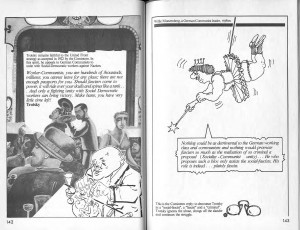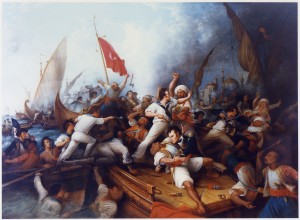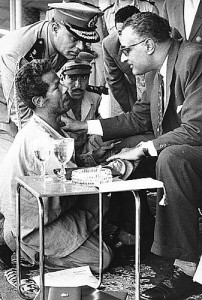Lenin’s liberalism
Chris Cutrone
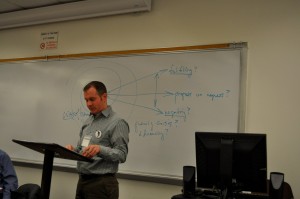
Presented on a panel with Paul LeBlanc and Lars T. Lih at the Left Forum 2011, Pace University, New York, March 19, 2011 (audio recording); at the third annual Platypus Affiliated Society international convention, the School of the Art Institute of Chicago, April 30, 2011; and at the Marxist Literary Group summer Institute on Culture and Society, University of Illinois at Chicago, June 22, 2011.
Introduction
Lenin’s Marxist politics has been profoundly misconstrued and distorted, both positively and negatively, as supposedly having wanted to strip capitalist society of its deceptive veneer and assert the unadorned proletariat as the be-all and end-all of “socialist” society. Certainly not merely the later Stalinist history of the Soviet Union, but also practices of the Soviet state under Lenin’s leadership in the Civil War, so-called “War Communism,” and the Red Terror, lent themselves to a belief in Lenin as a ruthless destroyer of “bourgeois” conditions of life. But, then, what are we to make, for instance, of Lenin’s pamphlets on The State and Revolution and “Left-Wing” Communism: An Infantile Disorder? For they emphasized both the necessary persistence of “bourgeois right” among the workers in the long transition from socialism to communism, requiring the continuation of state mediation, and the fact that Marxists had understood their effort as trying to overcome capital “on the basis of capitalism” itself. A prime example of Lenin’s insistence on the mediation of politics in society was his opposition to Trotsky’s recommendation that labor unions be militarized and subsumed under the state. Lenin wanted to preserve, rather, the important non-identity of class, party, and state in the Soviet “workers’ state,” which he recognized as necessarily carrying on, for the foreseeable future, “state capitalism” (characterized by “bureaucratic deformations” due to Russian conditions). Lenin thus wanted to preserve the possibility of politics within the working class, a theme that reached back to his first major pamphlet, What is to be Done? Lenin’s “last struggle” (Moshe Lewin) was to prevent the strangling of politics in the Soviet state, a danger he regarded not merely in terms of Stalin’s leadership, but the condition of the Bolsheviks more generally. For instance, Lenin critically noted Trotsky’s predilection for “administrative” solutions.
Georg Lukács, Karl Korsch and Theodor Adorno, teasing out a “Hegelian” dimension to Lenin’s Marxism, derived from Lenin’s theoretical writings and political practice an elaboration of the Marxist theory of social mediation in capital, through the politics of proletarian socialism, that sought to recover Lenin from a bad utopian perspective of the desire to do away with politics altogether. Rather, such Marxist critical theory following Lenin understood overcoming the “alienation” and “reification” of capital as providing the possibility for the true practice of politics, a neglected but vital contribution Lenin made to the development of Marxism. Lenin did not attempt to destroy modern forms of political mediation, but rather to achieve the true mediation of theory and practice, in politics freed from society dominated by capital. This was the content of Lenin’s liberalism, his “dialectical” Marxist attempt, not to negate, but rather to fulfill the desiderata of bourgeois society, which capital had come to block, and which could only be worked through “immanently.”
The controversy about Lenin
Lenin is the most controversial figure in the history of Marxism, and perhaps one of the most controversial figures in all of history. As such, he is an impossible figure for sober consideration, without polemic. Nevertheless, it has become impossible, also, after Lenin, to consider Marxism without reference to him. Broadly, Marxism is divided into avowedly “Leninist” and “anti-Leninist” tendencies. In what ways was Lenin either an advance or a calamity for Marxism? But there is another way of approaching Lenin, which is as an expression of the historical crisis of Marxism. In other words, Lenin as a historical figure is unavoidably significant as manifesting a crisis of Marxism. The question is how Lenin provided the basis for advancing that crisis, how the polarization around Lenin could provide the basis for advancing the potential transformation of Marxism, in terms of resolving certain problems. What is clear from the various ways that Lenin is usually approached is that the necessity for such transformation and advance of Marxism has been expressed only in distorted ways. For instance, the question of Marxist “orthodoxy” hinders the proper evaluation of Lenin. There was a fundamental ambiguity in the way Marxism addressed its own historical crisis, in the question of fidelity to and revision of Marx, for instance in the so-called “Revisionist Dispute” of the late 19th century. Lenin was a leading anti-revisionist or “orthodox” Marxist. This was also true of other Second International radical Marxists, such as Rosa Luxemburg and Leon Trotsky. In what ways did these figures, and above all Lenin, think that being true to Marx was required for the advancement and transformation of Marxism?
The Frankfurt School Critical Theorist Theodor Adorno, in his 1966 book Negative Dialectics, wrote of the degeneration of Marxism due to “dogmatization and thought-taboos.” There is no other figure in the history of Marxism who has been subject to such “dogmatization and thought-taboos” as much as Lenin. For Adorno, figures in the history of Marxism such as Lenin or Luxemburg or Kautsky should not be approached in terms merely of their theoretical perspectives or practical actions they took or advocated, but rather in their relation of theory and practice, or, why they thought they did what they did when they did so. As Adorno put it, theory and practice have a changing relation that “fluctuates” historically.
Lenin, among other Marxists, thought that the political party served an important function with regard to consciousness, and wrote in What is to be Done? of the key “importance of the theoretical struggle” in forming such a party. Lenin thought that theory was not simply a matter of generalization from experience in terms of trial and error, as in traditional (pre-Kantian) epistemology, but, importantly, in the Hegelian “dialectical” sense of history: this is how Lenin understood “theory.” As Lenin put it, history did not advance in a line but rather in “spirals,” through repetitions and regressions, and not simple linear “progress.” In this respect, the past could be an advance on the present, or, the present could seek to attain moments of the past, but under changed conditions. And such changed conditions were themselves not to be regarded simply as “progressive.” Rather, there was an important ambivalence to history, in that it exhibited both progress and regress. In his 1915 Granat Encyclopedia entry on Karl Marx, describing “dialectics” from a Marxian perspective, Lenin wrote,
In our times, the idea of development, of evolution, has almost completely penetrated social consciousness, only in other ways, and not through Hegelian philosophy. Still, this idea, as formulated by Marx and Engels on the basis of Hegel’s philosophy, is far more comprehensive and far richer in content than the current idea of evolution is. A development that repeats, as it were, stages that have already been passed, but repeats them in a different way, on a higher basis (“the negation of the negation”), a development, so to speak, that proceeds in spirals, not in a straight line; a development by leaps, catastrophes, and revolutions; “breaks in continuity”; the transformation of quantity into quality; inner impulses towards development, imparted by the contradiction and conflict of the various forces and tendencies acting on a given body, or within a given phenomenon, or within a given society; the interdependence and the closest and indissoluble connection between all aspects of any phenomenon (history constantly revealing ever new aspects), a connection that provides a uniform, and universal process of motion, one that follows definite laws — these are some of the features of dialectics as a doctrine of development that is richer than the conventional one.
With Marxism, the “crisis” of bourgeois society was recognized. The crisis of bourgeois society circa 1848 was what Marx called “capital,” a provocative characterization. The spiral development through which Lenin, among other Second International radicals such as Luxemburg and Trotsky, thought that history in the modern era had regressed through the “progress” since Marx and Engels’s time in 1848, the moment of the Communist Manifesto, showed how and why the subsequent development of Marxism sought to re-attain 1848. Was history since 1848 progress or regress? In a certain sense, it was both. In this history, bourgeois society appeared to both fulfill and negate itself. In other words, bourgeois society had become more itself than ever; in other respects, however, it grew distant from its earlier achievements and even undermined them. (For instance, the recrudescence of slave labor in the decades leading up to the U.S. Civil War.) The Second International radicals thus sought to return to the original potential of bourgeois society in its first moment of crisis, circa 1848. As Karl Kraus put it, in a way that registered deeply with Walter Benjamin and Adorno, “Origin is the goal.” Even though the crisis of capital or bourgeois society grew, the question was whether the crisis advanced. The Second International radicals recognized that while the crisis of capital, in Marx’s sense, grows, the crisis must be made to advance, as history does not progress automatically. It was in this sense that there was, potentially, a return of the 1848 moment in the development of Marxism itself, which was the attempt to make the growing crisis — what Luxemburg and Lenin called “imperialism,” and what Lenin termed capitalism’s “highest stage” — a historical advance.
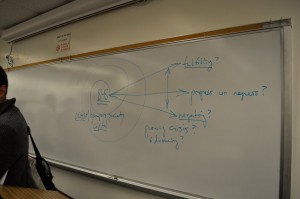
The paradox of such development and transformation of Marxism itself through the return to the past moment of potential and resultant “crisis” was expressed well by Karl Korsch, who wrote, in his 1923 essay on “Marxism and Philosophy,”
[The] transformation and development of Marxist theory has been effected under the peculiar ideological guise of a return to the pure teaching of original or true Marxism. Yet it is easy to understand both the reasons for this guise and the real character of the process which is concealed by it. What theoreticians like Rosa Luxemburg in Germany and Lenin in Russia have done, and are doing, in the field of Marxist theory is to liberate it from the inhibiting traditions of [Social Democracy]. They thereby answer the practical needs of the new revolutionary stage of proletarian class struggle, for these traditions weighed “like a nightmare” on the brain of the working masses whose objectively revolutionary socioeconomic position no longer corresponded to these [earlier] evolutionary doctrines. The apparent revival of original Marxist theory in the Third International is simply a result of the fact that in a new revolutionary period not only the workers’ movement itself, but the theoretical conceptions of communists which express it, must assume an explicitly revolutionary form. This is why large sections of the Marxist system, which seemed virtually forgotten in the final decades of the nineteenth century, have now come to life again.
So, what were these “revolutionary” aspects of Marxism that were recovered in the course of the “crisis of Marxism” (Korsch’s phrase), and how did Lenin help recover them?
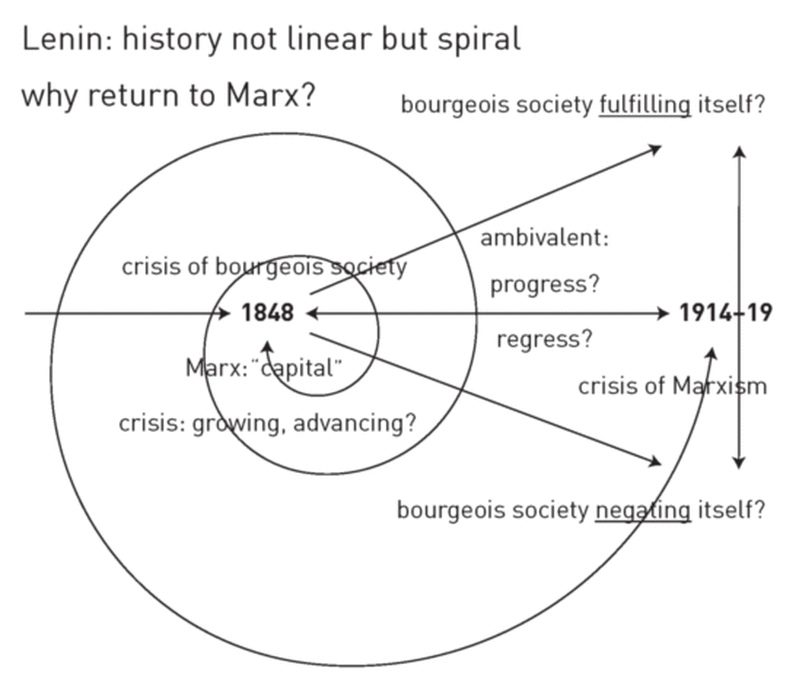
Lenin: history not linear but spiral
Lenin and the political party
Lenin made a portentous but indicative remark in the first footnote to his book What is to be Done?, in which he stated that,
Incidentally, in the history of modern socialism [there] is a phenomenon . . . in its way very consoling, namely . . . the strife of the various trends within the socialist movement. . . . [In] the[se] disputes between Lassalleans and Eisenachers, between Guesdists and Possibilists, between Fabians and Social-Democrats, and between Narodnaya Volya adherents and Social-Democrats, . . . really [an] international battle with socialist opportunism, [will] international revolutionary Social-Democracy . . . perhaps become sufficiently strengthened to put an end to the political reaction that has long reigned in Europe?
In other words, could working through the issue of opportunist-reformist “revisionism” within Marxism be the means for overcoming capital? This would appear to be the self-centrality of Marxism taken to its fullest flower. But there was a rationale to this. Not only did Lenin (subsequent to What is to be Done?) want the Mensheviks thrown out of Russian Social Democracy (Lenin agreed with the Mensheviks on excluding the so-called “economistic” tendencies of Marxism and the Jewish Bund workers’ organizations), but a seldom remarked fact was that Luxemburg, too, wanted the reformist Revisionists thrown out of the German Social Democratic Party (Kautsky waffled on the issue). Lenin and Luxemburg wanted to split the Second International from its reformists (or, “opportunists”).
Lenin not only thought that splits, that is, political divisions, in the Left or the workers’ movement were possible and desirable, but also necessary. The only differences Lenin had with figures such as Luxemburg or Kautsky were over particular concrete instances in which such splits did or could or should have occurred. For instance, Luxemburg thought that the split in Russian Social Democracy in 1903 was premature and so did not concur with Lenin and the Bolsheviks on its benefits. And, importantly, the question was not merely over whether a political split could or should take place, but how, and, also, when. Politics was a historical phenomenon.
There is the specific question of the “party” as a form of politics. Marx and Engels had written in the Communist Manifesto that, “The Communists do not form a separate party opposed to the other working-class parties.” So, this would appear to present a problem in the case of Lenin, who is notorious for the “party question.” But it poses a problem for the question of Marxism in general, for Marxism confronted other, opposed, political tendencies in the working class, for instance anarchism in the First International. What had changed between Marx and Engels’s time and Lenin’s?
As Marxists, Lenin and Luxemburg considered themselves to be vying for leadership of the social democratic workers’ movement and its political party; they didn’t simply identify with either the party or the movement, both of which originated independently of them. Both the workers’ movement and the social-democratic party would have existed without Marxism. For them, the party was an instrument, as was the workers’ movement itself. In responding to Eduard Bernstein’s remark that the “movement is everything, the goal nothing,” Luxemburg went so far as to say that without the goal of socialism the workers’ movement was nothing, or perhaps even worse than nothing, in that it exacerbated the problem of capitalism, for instance giving rise to the “imperialist” form of capitalism in the late 19th century. How were the social-democratic movement and its political parties understood by Marxists? For considering this, it is necessary to note well Marx’s critique of the Gotha Programme that had founded the German SPD and Engels’s subsequent critique of the Erfurt Programme that had made Marxism the official perspective of the Social Democratic Party. They critiqued these programmes because that’s what Marxists do: critique. No matter what had been written in these programmes, it was certain to elicit critiques from Marx and Engels.
The Marxists, that is, Marx and Engels, seem to have reluctantly gone along with the formation of a permanent party of social democracy, but not without serious reservations and caveats. The endorsement of party politics was provisional and conditional. For instance, in 1917, Lenin himself threatened to quit the Bolshevik party. Lenin thought that he could quit the party and continue to lead the revolution, that he would quit the party in order to lead the revolution.
Luxemburg’s biographer, British political scientist J.P. Nettl, traced the question of the social-democratic party to a set of problematic conceptions, all of which were challenged in practice and theory by the radical Left in the Second International, in figures such as Luxemburg and Lenin. The party could be conceived as an interest-aggregator and pressure-group on the state, advancing the interests of the working class. Or it could be conceived, as it was most overtly by its leadership, under its organizational leader August Bebel and its leading theorist Karl Kautsky, as a “state within the state,” or what Nettl termed an “inheritor party,” aiming to take power. Involved in the latter was a theory not only of revolution but also of socialism, both of which were problematical. Specifically troublesome was the idea of building up the working class’s own organization within capitalism so that when its final crisis came, political power would fall into the hands of the social democrats, who had organized the working class in anticipation of such an eventuality. But these were conceptions that were challenged and critiqued, not only by later radicals such as Luxemburg and Lenin, but also by Marx and Engels themselves. Marxists such as Marx and Engels and Lenin and Luxemburg were, rightly, deeply suspicious of the social-democratic party as a permanent political institution of the working class.
The problem of party politics
To situate this discussion properly, it is important to return to the classical liberal scorn for political parties. There was no term of political contempt greater than “party man,” or “partisan” politics, which violated not only the value of individuals thinking for themselves but also, perhaps more importantly, the very notion of politics in the liberal-democratic conception, especially with regard to the distinction between the state and civil society. Whereas the state was compulsory, civil society institutions were voluntary. While political parties, as forms of association, could be considered civil society organizations, the articulation of such formations with political power in the state struck classical liberal thinkers as particularly dangerous. Hegel, for one, explicitly preferred hereditary monarchy over democracy as a form of executive authority, precisely because it was free of such a problem. For Hegel, civil society would remain more free under a monarchy than under democracy, in which he thought political authority could be distorted by private interests. The danger lay in the potential for a civil society group to capture state power in its narrow, private interests. Moreover, in the classical liberal tradition, the idea of the professional “politician” was severely objectionable; rather, state-political figures rose through other civil society institutions, as entrepreneurs, professors, priests, etc., and only reluctantly took on the duty of public office: “It’s a dirty job, but somebody has to do it.”
This problem of modern politics and its forms recurred in the late 19th and early 20th centuries to thinkers such as Robert Michels, a student and associate of Max Weber, similarly concerned with the problem of modern “bureaucracy,” who, in a landmark study, compared the German SPD to the Democratic Party in the U.S., specifically with regard to the issue of the “party machine,” with its “ward bosses,” or machine-party politics, and the resulting tendency towards what Michels called “oligarchy.” Michels had been a member of the SPD, in its radical wing, until 1907. (Michels, who also studied the Socialist Party in Italy, went on to join Italian fascism under the former Socialist Benito Mussolini, because he thought fascism was a solution to the problem of “bureaucracy,” but that’s another story.) So the problem of party-politics was a well-known issue in Lenin’s time. For Second International radical Marxists such as Luxemburg and Lenin, the workers’ social-democratic party was not to be an interest-aggregator and permanent political institution of social power like the Democratic Party in the U.S. (which ultimately became the party of the labor unions). What, then, was the function of the social-democratic party, for figures such as Lenin and Luxemburg?
Obviously, Lenin’s concerns with politics were not the same as those of liberals, who sought to prevent the ossification of political authority from stymieing the dynamism of civil society in capitalism. For Lenin’s concern was above all with revolution, that is, fundamental social transformation. But was the issue of politics thus so different in Lenin’s case? This raises the important issue of in what way social revolution and transformation was related to “politics,” in the modern sense. That is, whether Lenin was interested in the “end” of politics as conceived in liberalism and practiced under capitalism, or instead concerned with overcoming the obstacle to the practice of politics that capitalism had become. How was overcoming the social problem capitalism had become a new beginning, for the true practice of politics? In this sense, it is important to address how political mediation was brought into being but ultimately shaped and distorted by the modern society of capital, especially after the Industrial Revolution.
“Politics” is a modern phenomenon. Modern politics is conditioned by the crisis of capital in modern history. Traditional civilization, prior to the bourgeois, capitalist epoch, was subject to crises that could only be considered natural or divine in origin. Modern society is subject, for Marxists (as well as for liberals), rather, to human-made crisis thus potentially subject to politics. Bourgeois politics indeed responds to the permanent crisis of capitalism — in a sense, that’s all it does — but in inadequate terms, naturalizing aspects of capitalism that should be regarded as changeable, but can only be so regarded, for Marxists, as radically and consistently changeable, from a proletarian or working-class socialist perspective. Thus, modern politics has been haunted by the “specter of communism,” or socialism. As Marx put it, in The Eighteenth Brumaire of Louis Bonaparte,
Every demand of the simplest bourgeois financial reform, of the most ordinary liberalism, of the most formal republicanism, of the most insipid democracy, is . . . stigmatized as “socialism.”
Furthermore, the concrete meaning of socialism or communism is subject to change. For Marxists, the demand for socialism in the 19th century was itself an engine of capitalist development, historically. The story of socialism, then, is bound up with the development of capital, and the question of whether and how its crisis was growing and advancing.
Moreover, the question of party-politics per se is a post-1848 phenomenon, in which modern socialism was bound up. In other words, the crisis of bourgeois society in capital after the Industrial Revolution and the failure of the “social republic” in 1848, was the crisis of bourgeois society as liberal. The rise of party-politics was thus a feature of the growing authoritarianism of bourgeois society, or, the failure of liberalism. As such, socialism needed to take up the problems of bourgeois society in capital that liberalism had failed to anticipate or adequately meet, or, to take up the cause of liberalism that bourgeois politics had dropped in the post-1848 world. For Marx, the problem was found most saliently in Louis Bonaparte’s popular authoritarianism against the liberals in Second Republic France, culminating in the coup d’état and establishment of the Second Empire. As Marx put it, the capitalists were no longer and the workers not yet able, politically, to master the bourgeois society of capital. Party-politics was thus bound up with the historical phenomenon of Bonapartism.
Lenin and the crisis of Marxism
The period of close collaboration between Luxemburg and Lenin around the 1905 Russian Revolution saw Luxemburg leveling a critique of the relation that had developed between the social-democratic party and the labor unions in her pamphlet on The Mass Strike, the Political Party, and the Trade Unions. (Also, during this time Luxemburg wrote a defense of Lenin against the Menshevik charge of “Blanquism,” which she called “pedantic,” and thought said more of the reformist opportunism of those leveling the charge against Lenin than about its target.) In her Mass Strike pamphlet, Luxemburg delineated specific and non-identical roles for the various elements she mentioned in her title, that is to say, general strike committees, political parties, and labor unions (not mentioned specifically were the “soviets,” or workers’ councils). In this sense, the “mass strike” was for Luxemburg a symptom of the historical development and crisis of social democracy itself. This made it a political and not merely tactical issue. That is, for Luxemburg, the mass strike was a phenomenon of how social democracy had developed its political parties and labor unions, and what new historical necessities had thus been brought into being. Luxemburg’s pamphlet was, above all, a critique of the social-democratic party, which she regarded as a historical symptom. This was prefigured in Luxemburg’s earlier pamphlet on Reform or Revolution?, where she addressed the question of the raison d’être of the social-democratic movement (the combination of political party and labor unions).
From this perspective of regarding the history of the workers’ movement and Marxism itself as intrinsic to the history of capitalism, then, it becomes possible to make sense of Lenin’s further articulations of politics in his later works, The State and Revolution and “Left-Wing” Communism: An Infantile Disorder, as well as in the political disputes that attended the young Soviet state that had issued from the Russian Revolution and had endured the Civil War and stabilization of international capitalism in the aftermath of WWI. Lenin maintained a strictly minimal conception of the state, restricting it to the monopoly of authority for the exercise of force, precisely in order to avoid an all-encompassing conception of the state as the be-all and end-all of politics. Similarly, Lenin deemed “infantile” the impatience of supposed radicals with existing forms of political mediation, such as parliaments, stating unequivocally that while Marxism may have “theoretically” surpassed a liberal conception of the state, this had not yet been achieved “politically,” that is, in practice. In response to Trotsky’s recommendation that labor unions be militarized in the Soviet state, Lenin maintained that unions needed to remain independent not only of the state, but also of the Communist Party itself. The workers needed the ability, according to Lenin, of asserting their rights against the party and the state. Lenin recognized the necessity of an articulated non-identity of state, political parties, and other voluntary civil society institutions such as labor unions. This was grounded in Lenin’s perspective that capitalist social relations could not be abolished in one stroke through political revolution, that, even though the state had been “smashed,” it was reconstituted, not on the basis of a new social principle, but on the continuation of what Lenin called “bourgeois right,” long after the political overthrow and even social elimination of a separate capitalist class. “Bourgeois right” persisted precisely among the workers (and other previously subordinate members of society) and so necessarily governed their social relations, necessitating a state that could thus only “wither away.” Politics could be only slowly transformed.
Finally, there is the question of Adorno’s continued adherence to Lenin, despite what at first glance may appear to be some jarring contradictions with respect to Lenin’s own perspective and political practice. For instance, in a late essay from 1969, “Critique,” Adorno praised the U.S. Constitutional system of “divisions of powers” and “checks and balances” as essential to preserving the critical function of reason in the exercise of political authority. But this was an example for Adorno, and not necessarily to be hypostatized as such. The making common of executive and legislative authority in the “soviet” system of “workers’ councils” was understood by Lenin, as Adorno well knew, to coexist with separate civil society organizations such as political parties, labor unions and other voluntary groups, and so did not necessarily and certainly did not intentionally violate the critical role of political mediation, at various levels of society.
It has been a fundamental mistake to conflate and confuse Lenin’s model of party politics for a form of state in pursuing socialism. Lenin presupposed their important non-identity. The party was meant to be one element among many mediating factors in society and politics. Moreover, Lenin’s party was meant to be one among many parties, including multiple parties of the working class, vying for its adherence, and even multiple “Marxist” parties, differing in their relation of theory and practice, or means and ends.
By contrast, there was nothing so repressive and authoritarian as the Kautskyan (or Bebelian) social-democratic “party of the whole class” (or, the “one class, one party” model of social democracy, that is, that since the capitalists are of one interest in confronting the workers, the workers need to be unified against the capitalists). The social-democratic party, after all, waged the counterrevolution against Lenin and Luxemburg.
Lenin preserved politics by splitting Marxism. For this, Lenin has never been forgiven. But, precisely for this, Lenin needs to be remembered. | §
Originally published in The Platypus Review 36 (June 2011).

